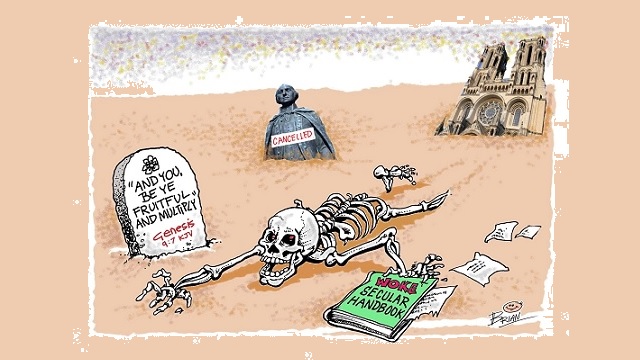Secularism: The Forgotten Factor in Falling Fertility

The decline in faith has precipitated a drop in procreation.
James McHenry is a lesser-known American Founding Father. A Scots-Irish Presbyterian born in County Antrim, Ireland, he came to the colonies in 1771, just five years before independence.
McHenry eventually became a military surgeon, signer of the Constitution and Secretary of War for Presidents Washington and Adams. Fort McHenry, of Star-Spangled Banner fame, bears his name. James McHenry was of the early American elite. He wrote:
“The holy Scriptures… can alone secure to society, order and peace, and to our courts of justice and constitutions of government, purity, stability, and usefulness.”
Holy Scriptures? How unwoke can you get?
Are we to assume that McHenry was racist, “homophobic,” nativist or a bigot? Can you imagine a member of the Biden cabinet referencing holy Scripture? Why, that would be a violation of “separation of church and state,” the Jeffersonian doctrine intended to prevent government from meddling in matters of faith. Today that doctrine has been wholly transmuted, weaponised to eradicate religious expression from the public square.
A different century
McHenry wasn’t the only American Founder whose words would get him cancelled today. How about the “father of our country” George Washington? Here is what Washington told a gathering of Delaware Indian leaders:
You do well to wish to learn our arts and our ways of life and above all, the religion of Jesus Christ. These will make you a greater and happier people than you are. Congress will do everything they can to assist you in this wise intention.
A compilation of religious sentiments by early American leaders would consume more terabytes than MercatorNet can handle. Needless to say, the Founders were people of faith. Back then, the West was commonly referred to as Christendom. As far as I know, no one found that offensive.
What does any of this have to do with demography?
Well, according to the World Atlas, “American women reaching child-bearing age in 1800 had on average of seven to eight live births in the course of their reproductive life.” In 1800, America was mostly rural and practising Christian.
In the early 1800s, two overarching factors influenced family life. The first was faith. The Biblical injunction “And you, be ye fruitful, and multiply; bring forth abundantly in the earth, and multiply therein.” (Genesis 9:7, KJV) was taken quite seriously.
Also, having children was sound economics. Children meant more hands on deck at the farm and family business. That was early American family planning.
From 1800, however, US fertility steadily declined, bottoming out in the 1940s. Then the postwar “baby boom” brought a 60% bump. The decline has since resumed, attributed to better public health (lower infant mortality), urbanisation, industrialisation, higher incomes and women in the workforce.
However, one tremendously significant reason for fewer children is usually omitted from demographic analyses: secularism.
What is secularism?
The term was coined c.1850 to denote a system which sought to order and interpret life on principles taken solely from this world, without recourse to belief in God and a future life. It is now used in a more general sense of the tendency to ignore, if not to deny, the principles of supernatural religion.
— The Concise Oxford Dictionary of the Christian Church
According to Merriam-Webster, secularism is “indifference to or rejection or exclusion of religion and religious considerations.”
The US is today’s secularist imperium. Secularism is a major contributing factor, usually overlooked, for persistent below-replacement fertility worldwide.
It is no secret that, on average, religious folks have more children than the non-religious. Why? Quite often, people of faith seriously follow the Biblical injunction to go forth and multiply. They believe in salvation and are usually somewhat less egocentric and materialistic than the average modern Joe.
But today we are in the age of Economic Man, defined by Merriam-Webster as
… an imaginary individual created in classical economics and conceived of as behaving rationally, regularly, and predictably in his economic activities with motives that are egoistic, acquisitive, and short-term in outlook.
By adopting the model of Economic Man, Western societies abandoned believing that humanity’s intellectual, spiritual and moral essence were in the image of God, a view that had sustained them for at least 18 centuries. This stone-cold secularism would eventually lead to Communism and the many other atheistic ideologies we suffer from today.
Major General JFC Fuller, in volume 3 of his Military History of the Western World, posited that “the myth of Economic Man [was] the fundamental factor in Capitalism, Socialism, and Communism.”
We are also addicted to the Idea of Progress, defined by the web’s Conservapedia as
… a worldview mainly promoted by globalists and liberals that argues “that the human condition has improved over the course of history and will continue to improve.”[1]
It is closely associated with the concept that man is perfectible and at some point in the future will, in fact, be perfect. While popular in contemporary culture, this idea has several serious flaws.
Flawed indeed. Shallow belief in the inevitability of human progress and unlimited temporal advancement disregards the transcendent, giving rise to the “prosperity gospel” and rank materialism.
Many prosper, but post-World War II affluence is proving to be ephemeral. Something is lacking. That is why China popularises Confucius, Russia subsidises Orthodoxy and Hungary promotes Catholicism in hopes of boosting birthrates. The US mandates wokeism and relies on immigration.
Today politicians rarely invoke religious faith except in throwaway lines for public consumption. People made of sterner stuff like James McHenry and George Washington are vilified and cancelled, their names expunged and statues removed. What will tomorrow’s children know of their heritage?
Yes, we’re oh-so-modern, high tech, sophisticated and secular. Having children is uncool. Modernity is slowly but surely killing us. The idea of progress that venerates Mammon, radical environmentalism, egocentrism and wokeism has Homo sapiens on the path to extinction. But as the old saying goes, “Fish are the last to notice the water.”
AUTHOR
Louis T. March
Louis T. March has a background in government, business and philanthropy. A former talk show host, author and public speaker, he is a dedicated student of history and genealogy. Louis lives with his family… More by Louis T. March
RELATED ARTICLES:
‘Permanent Male Sterilization’: Vasectomies Soar After SCOTUS Overturns Roe
RELATED VIDEO: Groomed – How Schools Sexualise Your Children.
EDITORS NOTE: This FEE column is republished with permission. ©All rights reserved.





